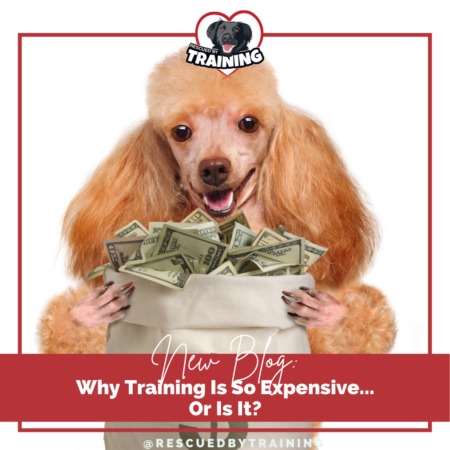If you think it’s expensive to hire a professional to do the job, wait until you hire an amateur
– Red Adair
I love helping people and their dogs. My mission is to help people and their dogs live happier lives together. And I provide tons of freely available content where I share nuggets of my expertise almost daily. I write blogs, my weekly newsletter, contribute to articles, offer free downloads and quality social media content (Facebook & Instagram) that is approachable and shareable. And all of these efforts take a lot of time, energy and money to produce. And many of my amazing colleagues do the same.
This is why it’s so surprising to me when people complain about the cost of training, try to haggle or shame trainers the same way they shame veterinarians. “If you really loved dogs, you’d do it for free or give me a discount because <insert reason here>.” This is one of the common reasons for trainer burnout. If all the qualified trainers burn out, who will be left to help people and dogs? But here’s the thing, making a living and loving animals are not mutually exclusive. You cannot expect competent help for your problem from a qualified professional without them being compensated fairly. It’s a classic example of you get what you pay for. Are there inexpensive trainers out there? Sure. And there’s also budget plastic surgeons. Which do you want helping you?
Dog training is unregulated in the US. That means there’s no licensing, credentialing or education needed to call yourself a trainer and get paid. And any methods, including those that physically and emotionally hurt dogs, are still completely legal. There’s no consumer protection, because animals are considered property, if your dog ends up worse. This is why you must demand transparency and ask questions.
Those of us who take this profession seriously seek out quality education, certifications, accreditation and professional memberships. Many of us have completed education that includes graduate level behavior analysis. We invest in continuing education since the science of animal learning is a science and we are continuing to learn new things as research is done. Maintaining all that knowledge, staying current, so that am confident my expertise will yield results costs money. Training courses, certification costs, renewal costs, conferences, journal and other subscriptions, continuing ed and professional membership fees all cost money. And a lot of it. Being a qualified professional costs money to maintain and remain at the forefront of current education and research. Expecting professionals to give away all that knowledge without payment is at best, unfair. This is my full time job, not a side hustle. I take serious behavior modification cases where many people come to me after having gone through several other trainers and by the time they get to me, they often say “if you can’t help us, we have to rehome or euthanize this dog.” These are not cases that should be entrusted to an unqualified trainer.
And in many of these cases, because I’m the third or fourth trainer, I am, as my mentor Jean Donaldson says, the mop up squad. Behavior consultants, like me, who specialize in complex behavior cases are often charged with the task of cleaning up other peoples’ messes – bad breeding, poor socialization, lack of education, fallout from inhumane training or well-meaning, but bad advice from friends, family or the internet. And all those things didn’t help and likely made things worse. And now it’s on me to “fix” it.
Except there’s no magic to dog training. I didn’t get a magic wand when I graduated The Academy For Dog Trainers. Real behavior change takes time and there are no quick fixes to long term behavior modification. These problems certainly didn’t appear overnight (and if they did, you need to head to your vet!) so they definitely will not be resolved overnight. Anyone who promises immediate results is likely employing tools or methods that hurt or scare your dog. Anyone who promises guarantees is also a hack. It is unethical for any trainer to guarantee results. Dogs are animals, and we can not predict how they will behave, as behavior is subject to many factors, including but not limited to environmental changes, medical issues/pain, reinforcement history, human behavior and genetics. Dogs are not robots and behavior fluctuates with circumstances. Behavior, whether dog or human, is never 100% all the time.
Unqualified training will be at best:
- Inefficient
- Ineffective
- Inconsistent/unreliable
- Frustrating
At worst unqualified training will:
- Exacerbate the issues
- Cause physical or mental distress to your dog
- Increase your and your dog’s anxiety
- Create a public safety risk, if your dog is aggressive
- Decrease your dog’s quality of life
So next time you think training is expensive, pause and consider the long term costs of not hiring a qualified professional. Unqualified training will likely cost you more work, more money, more time, more anxiety and more heartache in the long run. Fortunately myself and many of my colleagues are here to give you the help you and your dog need. If that’s you, grab a one on one appointment with me here.
Happy training!
![]()




